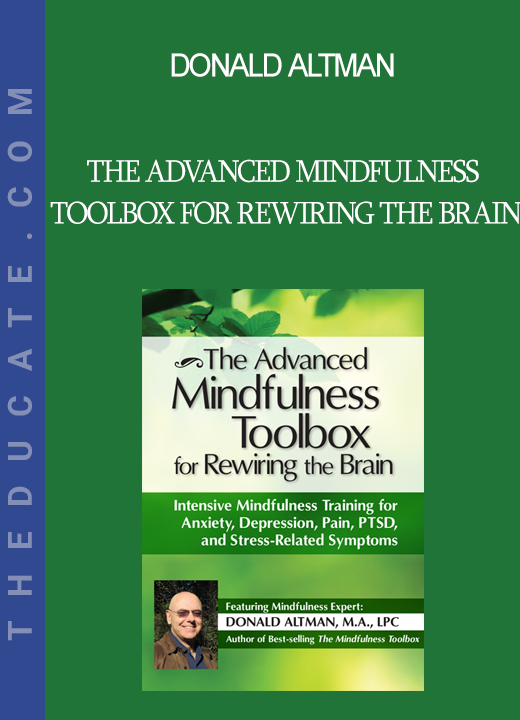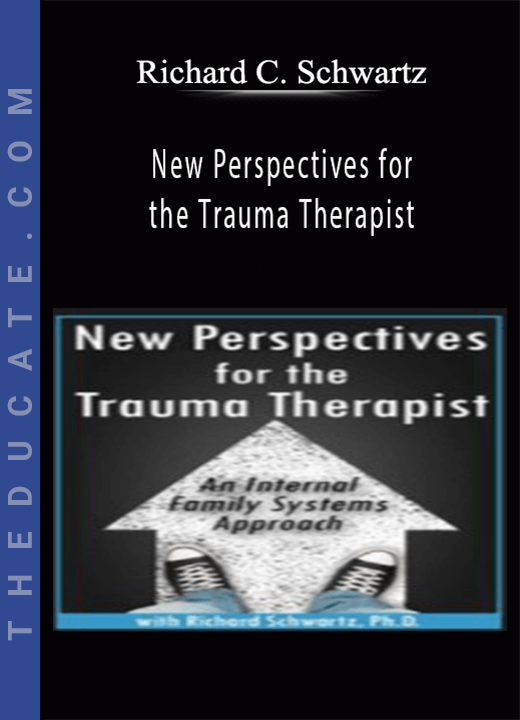Description

Donald Altman – The Advanced Mindfulness Toolbox for Rewiring the Brain: Intensive 2-Day Mindfulness Training for Anxiety, Depression, Pain, PTSD, and Stress-Related Symptoms
In this in-depth workshop, national mindfulness teacher and author Donald Altman will demonstrate a variety of powerful clinical tools—from grounding and attention-focusing skills to metacognitive awareness and mindfulness skills—for helping clients to rewire the brain as they overcome clinical anxiety, depression, chronic pain, PTSD, addictive cravings, and stress-related symptoms. It’s no secret that over 40 million Americans suffer from an anxiety disorder, 25 million from clinical depression, and more 100 million from chronic pain that shatters their lives and relationships. This highly experiential workshop utilizes practical and evidence-based mindfulness tools that radically alter clients’ habitual and conditioned reactions to these and other forms of suffering.
Drawing upon brain science and concepts from Interpersonal Neurobiology, this workshop will make brain science easy to understand for your clients. You’ll be able to clearly demonstrate for clients how they can regulate emotions and rewire their brains through practices such as focused attention, selective memory, and strengths-based storytelling. In addition, you will learn how to adapt these many tools for different populations in order to create a clear roadmap to wellness for clients. In all, this training will have you returning to your practice with a comprehensive menu of transformative mindfulness tools to draw from—and that clients can use to regulate emotions and find calm.
Donald is known for creating compelling experiential and participatory trainings. Whether you are experienced in mindfulness or are new to these techniques, this special workshop is certain to get you enthused and excited about experiencing and using mindfulness for joy, calm, and healing in your own life, as well as in your therapy practice. You won’t want to miss out on this unique mindfulness training opportunity.
- Describe and define mindfulness in a more broad way for the client.
- Summarize the basics lessons of Interpersonal Neurobiology and how mindfulness can rewire the brain.
- Explain the effects of stress and cortisol, and how diaphragmatic breathing turns on the parasympathetic nervous system.
- Demonstrate how to use stories as a way to shift awareness, enhance relationships, and recognize strengths.
- Use key mindful body practices that lead to better self-care and cognitive brain function.
- Describe multiple evidence-based methods for shifting attention that produce greater positive emotions moment by moment.
- Discuss the difference between ‘good’ and ‘bad’ stress, and the 4-methods for reducing stress.
- Examine the damaging effects of stress at cellular level and how lifestyle changes can alter these.
- Demonstrate stress-reducing transition skills through movement and walking.
- Describe how to use guided meditations designed to help clients to better accept, reframe and manage pain.
- Effectively use the practice of constructive distancing to help clients get a broader perspective on any situation.
- Describe affirmations and methods for developing self-compassion and feelings of safety, trust, and forgiveness.
GET THE ADVANCED MINDFULNESS TOOLBOX FOR REWIRING THE BRAIN: INTENSIVE 2-DAY MINDFULNESS TRAINING FOR ANXIETY, DEPRESSION, PAIN, PTSD, AND STRESS-RELATED SYMPTOMS OF AUTHOR DONALD ALTMAN
MINDFULNESS AND CUTTING-EDGE RESEARCH
- Mindfulness as a metacognitive skill
- Negative effects of a wandering mind
- Breathing reduces rumination and anxiety
- Useful (and free) web resources
INTRODUCE MINDFULNESS TO YOUR CLIENTS
- Expand Your Mindfulness Vocabulary
- Help clients understand mindfulness
- Find the right metaphor
- Using clients’ learning styles
- Practice: Getting into the Present Moment
THE POWER OF SENSE GROUNDING
- Anxiety reduction with sense grounding
- Mindfulness for transitioning between activities
- Physical grounding method of dropping into the body
- Integrates progressive muscle relaxation
- Good for spatial, visual, hands-on learning styles
- Practice: Palm the Present Moment
BRAIN BASICS, METACOGNITION, AND INTERPERSONAL NEUROBIOLOGY
- Emotional Regulation for Depression and Anxiety
- Balance the brain’s default survival mode
- Effects of cortisol on learning and immune system
- Visual Brain Model for clients
- The brain’s mindfulness module
- Train the brain for calm response and metacognition
- Navy Seals, arousal control & parasympathetic nervous system
- Heart rate variability & relaxation response
- Practice: The Power of Breath
- Enhancing effectiveness of a breathing practice
- Practice: Ask Clients the 3-Minute Question
THE BEHAVIORAL SIDE OF MINDFULNESS
- Core lifestyle skills awareness training
- Sleep hygiene
- Managing sleep
- Sleep rituals and strategies
- Healthy eating/nutrition
- Caffeine, protein, neurotransmitters, and the brain
- Exercise
- Manage Technology
- How weapons of mass distraction may be rewiring the brain
- Sleep hygiene
- Practice: Assessment of Technology and Time
- Focus the mind (useful for ADHD)
- Integrate breath with a word/image
- Practice: Be the Pebble
MINDFUL LAUGHTER FOR DEPRESSION AND GRIEF: TOOLS FOR THE “TERMINALLY SERIOUS”
- Research on laughter and mood
- Biochemistry of laughter & human laughter response
- Laughter yoga and laughter in therapy
- Practice: The Lightness of Laughter
THE UPLIFTING POWER OF STORYTELLING
- Storytelling to overcome depression and build relationships
- Fredrickson’s Broaden and Build Theory of Positive Emotions
- Broaden attention; find resilience
- Stories are fundamental to attachment
- Build relationships through a story of strengths
- Practice: Identifying Strengths & Strengths Journal
MANAGING MOODS THROUGH ATTENTION AND SELECTIVE MEMORY
- Master attention and memories
- Savoring of the present moment
- Practice: Here and Now Pleasantness
- Using selective memory to savor the past and future
- Practice: Savoring Success: Past, Present, and Future
HARNESSING GRATITUDE TO INCREASE POSITIVE EMOTIONS
- Managing depression with gratitude
- Gratitude research
- Four psychological reasons for gratitude
- Techniques that make gratitude interpersonal and enhancing Supportive social networks
- Practice: The G.L.A.D. Technique
HEALING EMOTIONAL PAIN THROUGH ACCEPTANCE, FORGIVENESS, AND COMPASSION
- Forgiveness for moving forward from trauma
- Forgiveness is a skill
- Research on compassion practice
- Changes in brain function
- Security priming for feelings of safety and trust
- Develop positive emotions and resources
- Practice: Loving-Kindness Affirmation
THE TRUTH ABOUT STRESS:
- Biological markers of stress: telomeres and aging
- Identify and assess client stress levels
- Perceived Stress Scale
- Epstein Stress-Management Inventory
- Practice: Be a Smart Stress-Avoider
MINDFULNESS FOR ADDICTIVE CRAVINGS
- Emotional Regulation for Cravings
- Impulse Control and Craving Control Using Grounding
- Practice: S-T-O-P Grounding Technique
CHANGING THE PERCEPTION OF PAIN: MINDFULNESS FOR CHRONIC PAIN
- Introduction to the Body Scan Practice
- Research and history
- Demonstrates how to pay attention non-judgmentally
- Powerful grounding method; applications
- Practice: Surf the Body (The Body Scan)
THE POWER OF SENSE GROUNDING TRAUMA: CONSTRUCTIVELY DISTANCE FROM PTSD AND NEGATIVITY
- Three kinds of sense grounding
- Practice: Focusing on Favorites
REDUCING ANXIETY BY MINDFULLY MANAGING TRANSITIONS
- Managing transitions through movement and nature
- Process orientation vs. outcome orientation
- Attention Restoration Theory
- Effects of nature on focus, moods, & healing
- Slowing down with nature to get present
- Integrated Tools:
- Practice: Ground-Surfing (Mindful Walking)
- Practice: Turning Down the Volume with Nature
RE-ENVISIONING AND REFOCUSING
- Working with difficult, unresolved life situations
- Metacognition as a path to insight
- Practice: Bear Meditation
PUTTING IT ALL TOGETHER
- Creating a mindfulness roadmap for clients
- Bundling practices together
- Engage through learning styles
- Maintaining skills
- Follow-up and reinforcement






Reviews
There are no reviews yet.